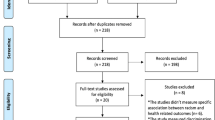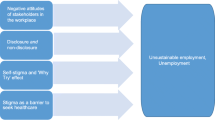Abstract
Based on fieldwork with a highly uninsured and underinsured Korean American population, this article maps how the current healthcare system in the United States disenfranchises those of marginal insurance status. The vulnerability of these disenfranchised biological citizens is multiplied through exposure to disproportional health risks compounded by exclusion from essential healthcare. The first-generation Korean Americans, who commonly work in small businesses, face the double burden of increased health risks from long, stress-laden work hours and lack of access to healthcare due to the prohibitive costs of health insurance for small business owners. Even as their health needs become critical, their insurance status and costly medical bills discourage them from visiting healthcare institutions, leaving Korean Americans outside the “political economy of hope” (Good, Cult Med Psychiatry 52:61–69, 2001). Through an ethnographic examination of the daily practice of doing-without-health among a marginalized sub-group in American society, this paper articulates how disenfranchised biological citizenship goes beyond creating institutional barriers to healthcare to shaping subjectivities of the disenfranchised.
Similar content being viewed by others
Notes
Fieldwork was conducted in Houston from January 2004 to August 2004 and in Los Angeles from May 2007 to July 2007.
The interviewees’ ages range from 32 to 74 with a mean age of 54.
All names are pseudonyms.
All interviews were conducted in Korean and translated into English later by the first author.
For example, Bae, a 58-year-old Korean American man in Houston, enumerated his previous businesses as he moved from a grocery store and a beauty supply shop in a minority community to a Korean grocery and his current dry cleaning business in an upper-class community.
Among the 48 interviewees, 9 are categorized as underinsured. When they are added to the 22 uninsured, a total of 31 are uninsured or underinsured.
When Korean Americans decide to visit healthcare institutions, the population tends to visit Korean American clinics usually located in Korean Town. However, using clinics in Korean Town is also impeded by insurance status and costly medical bills.
Many issues frame accessibility to healthcare among immigrant populations, including linguistic and cultural ones. For Korean Americans (a highly uninsured and underinsured population) health insurance status is the critical issue shaping their practice of not seeking healthcare. Linguistic and cultural barriers do little to explain why many Korean Americans do not visit clinics in Korean Town run by Korean American doctors.
References
Ablemann, Nancy, and John Lie 1995 Blue Dreams: Korean Americans and the Los Angeles Riots. Cambridge: Harvard University Press.
Ayanian, John Z, Joel S. Weissman, Eric C. Schneider, Jack A. Ginsburg, and Alan M. Zaslavsky 2000 Unmet Health Needs of Uninsured Adults in the United States. Journal of the American Medical Association 284: 2061–2069.
Becker, Gay 2001 Effect of Being Uninsured on Ethnic Minorities’ Management of Chronic Illness. Western Journal of Medicine 175: 19-23.
Becker, Gay 2004 Deadly Inequality in the Health Care “Safety net”: uninsured Ethnic Minorities’ Struggle to Live with Life-threatening Illnesses. Medical Anthropology Quarterly 18: 258–275.
Becker, Gay 2007 The Uninsured and the Politics of Containment in U.S Health care. Medical Anthropology 26: 299–321.
Brown, E. Richard, Victoria D. Ojeda, Roberta Wyn, and RebeKa Levan 2000 Racial and Ethnic Disparities in Access to Health Insurance and Health Care. UCLA Center for Health Policy Research and The Henry J. Kaiser Family Foundation, http://www.kff.org/uninsured/1525-index.cfm, accessed January 9, 2009.
Brown, E. Richard, Shana A Lavarreda, Ninez Ponce, Jean Yoon, Janet Cummings, and Thomas Rice 2007 The State of Health Insurance in California: Findings from the 2005 California Health Interview Survey. http://www.healthpolicy.ucla.edu/pubs/publication.asp?pubID=226, accessed January 25, 2009.
Chapman, Rachel 2006 Chikotsa—Secrets, Silence, and Hiding: social Risk and Reproductive Vulnerability in Central Mozambique. Medical Anthropology Quarterly 20(4): 487–515.
Chin, Dorothy, David T. Takeuchi, and Dong Suh 2000 Access to Health Care among Chinese, Korean, and Vietnamese Americans. In Minority Health in America: Findings and Policy Implications from the Commonwealth Fund Minority Health Survey. Hogue, J. R. Carol, Martha A. Hargraves and Karen S. Collins eds., pp. 77–96. Baltimore: Johns Hopkins University Press.
Choi, Hyunsun 2010 Religious Institutions and Ethnic Entrepreneurship: the Korean Ethnic Church as a Small Business Incubator. Economic Development Quarterly 24(4): 372–383.
Das, Veena, and Ranendra K. Das 2007 How the Body Speaks: illness and the Lifeworld among the Urban Poor. In Subjectivity: ethnographic Investigations. Biehl, Joao, Byron Good, and Arthur Kleinman eds., pp 66–97. Berkeley: University of California Press.
Dressler, William W. 1999 Modernization, Stress, and Blood Pressure: new Directions in Research. Human Biology 71: 583–605.
Dressler, William W., and James Bindon 2000 The Health Consequences of Cultural Consonance: cultural Dimensions of Lifestyle, Social Support, and Arterial Blood Pressure in an African American community. American Anthropologist 102(2): 244–260.
Dressler, William W., Kathryn S. Oths, and Clarence C. Gravlee 2005 Race and Ethnicity in Public Health Research: models to Explain Health Disparities. Annual Review of Anthropology 34: 231–252.
Dutton, Paul 2007 Differential Diagnoses: a Comparative History of Health Care Problems and Solutions in the United States and France. Ithaca, NY: Cornell University Press.
Good, Mary-Jo Delvecchio 2001 The Biotechnical Embrace. Culture, Medicine and Psychiatry 52: 61–69.
Farmer, Paul 1999 Infections and Inequalities: the Modern Plagues. Berkeley: University of California Press.
Hadley Jack 2003 Sicker and Poorer—the Consequences of Being Uninsured: a Review of the Research on the Relationship between Health Insurance, Medical Care Use, Health, Work, and Income. Medical Care Research and Review 60 (2, Supplement): 3S-75S.
Horton, Sarah 2004 Different Subjects: the Health Care System’s Participation in the Differential Construction of the Cultural Citizenship of Cuban Refugees and Mexican Immigrants. Medical Anthropology Quarterly 18(4): 472–489.
Horton, Sarah 2007 Toward an Ethnography of the Uninsured: Gay Becker’s Work in Progress. Medical Anthropology 26: 293–298.
Hoffman, Beatrix 2006 Restraining the Health Care Consumer: the History of Deductible and Co-payments in U.S. Health Insurance. Social Science History 30(4): 501–528.
Hughes, Dora L. 2002 Quality of Health Care for Asian Americans: a Fact Sheet. The Commonwealth Fund. http://www.commonwealthfund.org/publications/publications_show.htm?doc_id=221613, accessed January 09, 2009.
Hurh, Won Moo 1998 The Korean Americans. Westport: Greenwood Press.
Institute of Medicine 2002 Care without Coverage. Washington DC: National Academy Press.
Janes, Craig R. 1990 Migration, Social Change, and Health: a Samoan Community in Urban California. Stanford: Stanford University Press.
Jo, Angela M., Annette E. Maxwell, Bryan Yang, and Roshan Bastani 2010 Conducting Health Research in Korean American Churches: perspectives from Church Leaders. Journal of Community Health 35: 156–164.
Kaiser Family Foundation and Health Research and Education Trust 2011 Employ Health Benefits: 2011 Annual Survey. http://ehbs.kff.org/pdf/8226.pdf, accessed February 16, 2012.
Kang, Yongseok 2007 Dry Cleaning Agency (in Korean). Jungangilbo USA June 17.
Kelleher, C. C., J. W. Lynch, L. Daly, S. Harper, N. Fitz-simon, Y. Bimpeh, E. Daly, and H Ulmer. 2006 The “Americanisation” of Migrants: evidence for the Contribution of Ethnicity, Social Deprivation, Lifestyle and Life-course Processes to the Mid-20th century Coronary Heart Disease Epidemic in the US. Social Science and Medicine 63: 465–484.
Lee, Keum-sook 2010 Medical Exams Show Higher Prevalence Rates among Korean Americans than Koreans (in Korean). Chosunilbo March 17. http://health.chosun.com/site/data/html_dir/2010/03/16/2010031602101.html, accessed July 20, 2010.
McWilliams, Michael J. 2009 Health Consequences of Uninsurance among Adults in the United States: recent Evidence and Implications. The Milbank Quarterly 87(2): 443–494.
Min, Pyong Gap 1990 Problems of Korean Immigrant Entrepreneurs. International Migration Review. 24: 436–455.
Min, Pyong Gap 1992 The Structure and Social Functions of Korean Immigrant Churches in the United States. International Migration Review. 26: 1370–1394.
Min, Pyong Gap 1996 Caught in the Middle: Korean Merchants in America’s Multiethnic Cities. Berkeley: University of California Press.
Min, Pyong Gap 1998 Changes and Conflicts: Korean Immigrant Families in New York. Boston: Allyn and Bacon.
Min, Pyong Gap, and Mehdi Bozorgmehr 2000 Immigrant Entrepreneurship and Business Patterns: a Comparison of Koreans and Iranians in Los Angeles. International Migration Review. 34 (3): 707–738.
Moon, Jin-ho 2008 Asiana Releases a New Tour Package for Medical Exam. (in Korean) Jungangilbo USA, February 14. http://www.koreadaily.com/news/read.asp?art_id=515962, accessed January 14, 2009.
National Institutes of Health 2006 Women of Color Health Data Book. http://orwh.od.nih.gov/pubs/WomenofColor2006.pdf, accessed January 09, 2009.
Nguyen, Vinh-Kim, and Karine Peschard 2003 Anthropology, Inequality, and Disease: a Review. Annual Review of Anthropology 32: 447–474.
Ong, Aihwa 1996 Cultural Citizenship as Subject-making: immigrants Negotiate Racial and Cultural Boundaries in the United States. Current Anthropology 37: 737–762.
Park, Kyeyoung 1997 The Korean American Dream: immigrants and Small Business in New York City. Ithaca: Cornell University Press.
Parikh, Shanti 2007 The Political Economy of Marriage and HIV: the ABC Approach, “Safe” Infidelity, and Managing Moral Risk in Uganda. American Journal of Public Health 97(7): 1198–1208.
Rose, Nikolas 2007 The Politics of Life Itself: biomedicine, Power, and Subjectivity in the Twenty-First Century. Princeton: Princeton University Press.
Rylko-Bauer, Barbara, and Paul Farmer 2002 Managed Care or Managed Inequality? A Call for Critiques of Market-based Medicine. Medical Anthropology Quarterly 16: 476–502.
Saber, Ariel, and Suevon Lee 2007 Judge Tries Suing Pants off Dry Cleaners. New York Times, June 13.
Shin, Hosung, Howin Song, Jinsook Kim, and Janice C. Probst 2005 Insurance, Acculturation, and Health Service Utilization among Korean–Americans. Journal of Immigrant Health 7: 65–74.
Steffen, R. Patrick, Timothy B Smith, Michael Larson, and Leon Butler 2006 Acculturation to Western Society as a Risk Factor for High Blood Pressure: a Meta-Analytic Review. Psychosomatic Medicine 68: 386–397.
Whyte, Susan 2009 Health Identities and Subjectivities: the Ethnographic Challenge. Medical Anthropology Quarterly 23 (1): 6–15.
Wilkinson, Richard G. 2005 The Impact of Inequality: how to Make Sick Societies Healthier. New York: The New Press.
Wilper, Andrew P, Steffie Woolhandler, Karen E. Lasser, Danny McCormick, David H. Bor and David U. Himmelstein. 2009 Hypertension, Diabetes, and Elevated Cholesterol among Insured and Uninsured. Health Affairs 28(6): 1151–59.
Author information
Authors and Affiliations
Corresponding author
Rights and permissions
About this article
Cite this article
Kim, T., Haney, C. & Hutchinson, J.F. Exposure and Exclusion: Disenfranchised Biological Citizenship among the First-Generation Korean Americans. Cult Med Psychiatry 36, 621–639 (2012). https://doi.org/10.1007/s11013-012-9278-7
Published:
Issue Date:
DOI: https://doi.org/10.1007/s11013-012-9278-7




